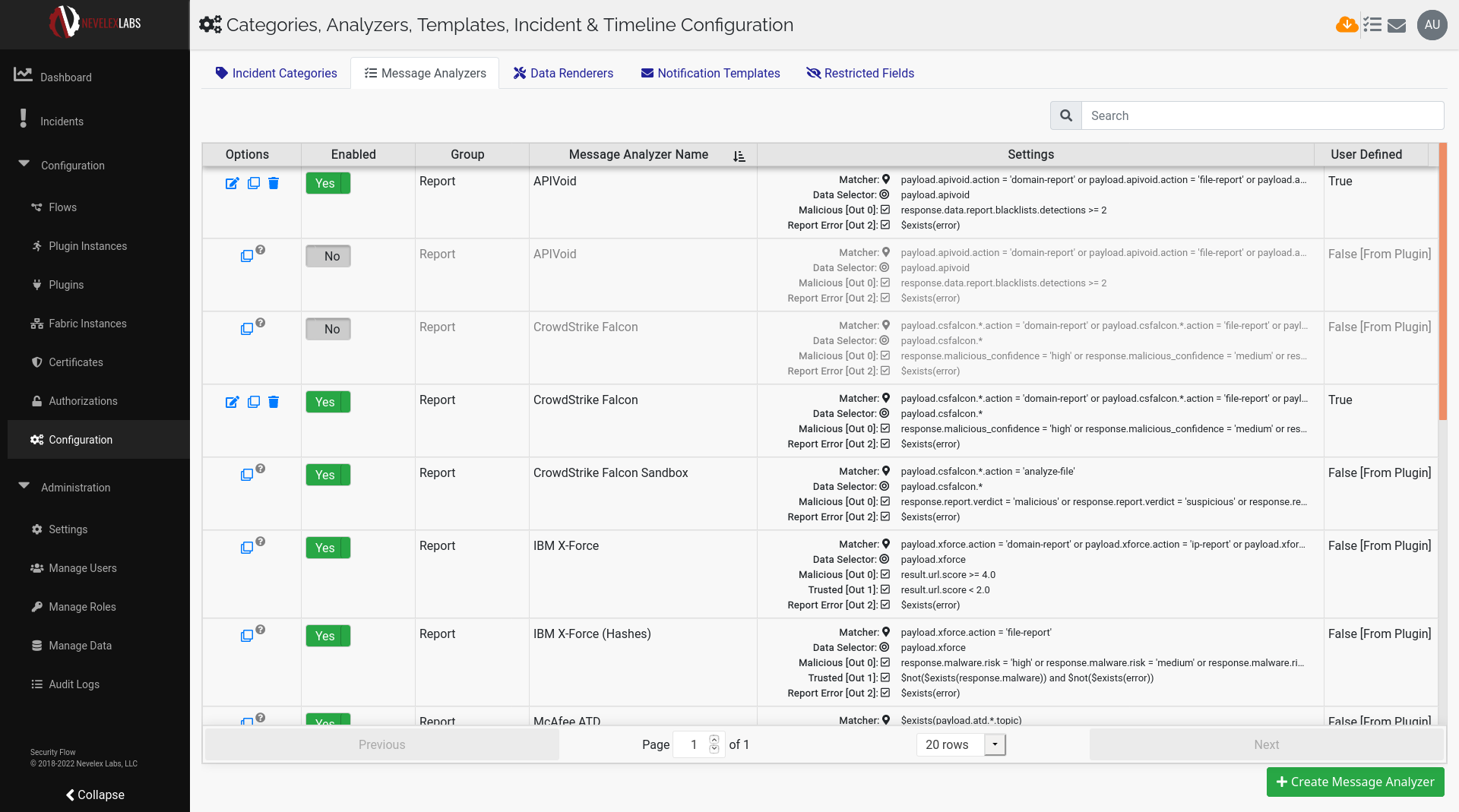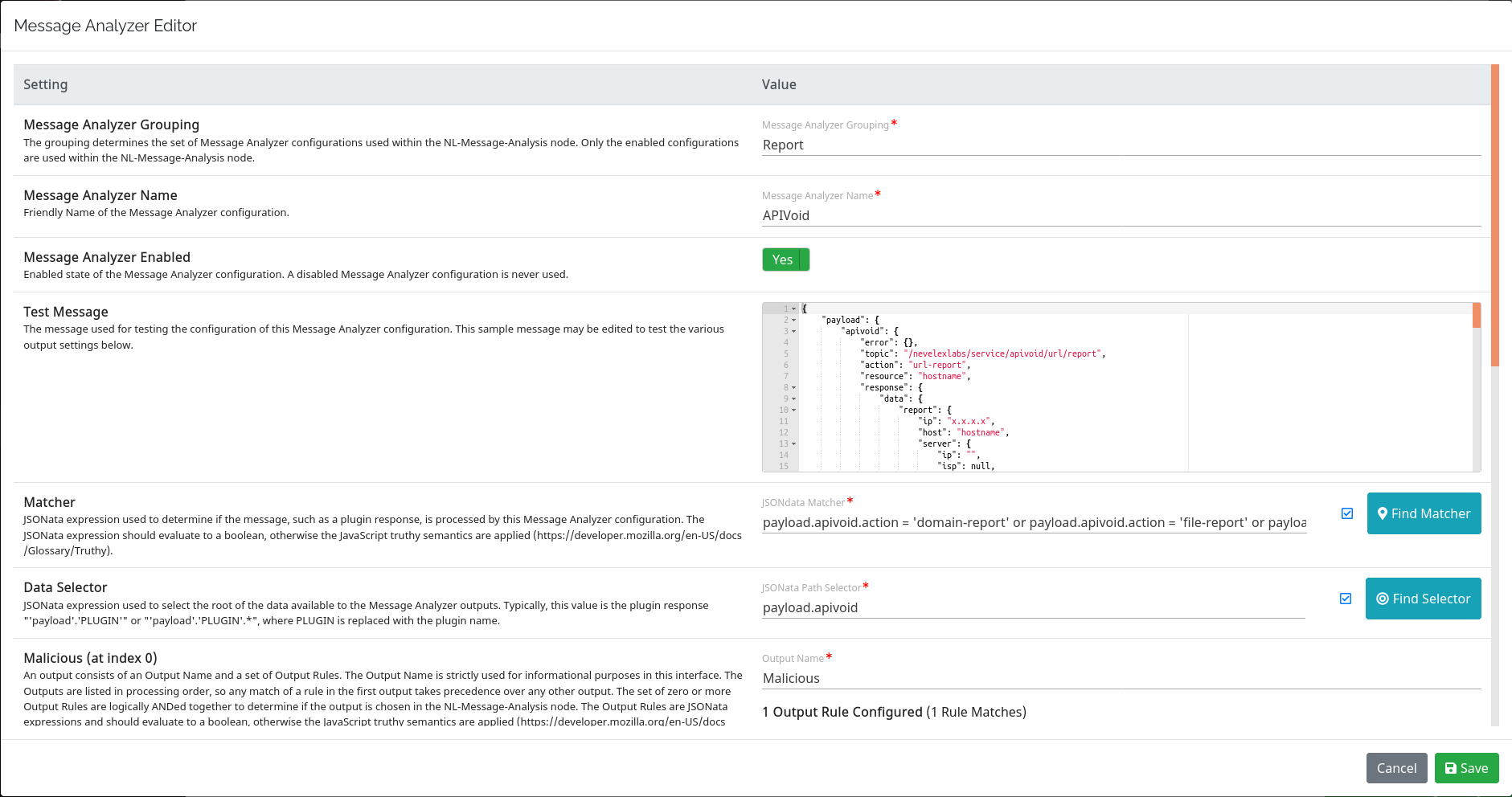
Message Analyzers Tab
The Message Analyzers tab within the Categories, Analyzers, Templates, Incident & Timeline Configuration Screen allows for the management of Message Analyzer configurations if the current user has Flows permissions assigned. A Message Analyzer configuration defines the runtime behavior of the NL-Message-Analysis node.

| Column | Details |
|---|---|
| Options | Operations allowed on the Message Analyzer configuration. Configurations that are obtained from a Plugin are not editable because they are overwritten when a new version of the Plugin is installed. However, the Plugin supplied configurations may be cloned and edited. |
| Enabled | The enabled state of the Message Analyzer configuration. Only enabled configurations are ever used. |
| Group | Representation of a common category of analyzer configurations. Configurations with the same group must all have the same number of outputs with all the outputs being in the same order. |
| Message Analyzer Name | A user-friendly name for the Message Analyzer configuration. The name is only used for informational purposes. |
| Settings | A summary of the Message Analyzer configuration. The Matcher is a JSONata expression that should evaluate to a boolean value indicating that the configuration's Output Rules should be tested against the JSON matched by the Data Selector. The Data Selector is a JSONata expression that selects a portion of the input message against which the Output Rules will be tested. The Outputs (Out #) define a set JSONata expressions which evaluate to a boolean. |
| User Defined | Indication of how the Message Analyzer configuration was created. When True, indicates the Message Analyzer configuration is user created. When False, this indicates the Message Analyzer configuration was defined when a Plugin was installed. |
| Button | Description |
|---|---|
| Edit the Message Analyzer configuration. | |
| Clone the Message Analyzer configuration to create a new configuration based on the original. | |
| Delete the user defined Message Analyzer configuration. | |
| Create Message Analyzer | Creates a new Message Analyzer configuration. |
Edit or Create a Message Analyzer
To Edit a Message Analyzer configuration click the edit icon (), edit the configuration, and click the Save button.
Creating involves the same steps, but is initiated by clicking the Create Message Analyzer button or clicking the clone icon ().

| Setting | Details |
|---|---|
| Message Analyzer Grouping | The grouping determines the set of Message Analyzer configurations used within the NL-Message-Analysis node. Only the enabled configurations are used within the NL-Message-Analysis node. |
| Message Analyzer Name | A user-friendly name for the Message Analyzer configuration. The name is only used for informational purposes. |
| Message Analyzer Enabled | Enabled state of the Message Analyzer configuration. A disabled Message Analyzer configuration is never used. |
| Test Message | The message used for testing the configuration of the Message Analyzer configuration. The sample message may be edited to test the various output settings. Sample messages may also be copied from an Incident Timeline or from the output of a debug node in the flows. |
| Matcher | JSONata expression used to determine if the message, such as a plugin response, is processed by this Message Analyzer configuration. The JSONata expression should evaluate to a boolean, otherwise the JavaScript truthy semantics are applied (https://developer.mozilla.org/en-US/docs/Glossary/Truthy). |
| Data Selector | JSONata expression used to select the root of the data available to the Message Analyzer outputs. Typically, this value is the plugin response 'payload'.'PLUGIN' or 'payload'.'PLUGIN'.*, where PLUGIN is replaced with the plugin name. |
| [Output Name] (at index #) |
An output consists of an Output Name and a set of Output Rules. The Output Name is strictly used for informational purposes in this interface. The Outputs are listed in processing order, so any match of a rule in the first output takes precedence over any other output. The set of zero or more Output Rules are logically ANDed together to determine if the output is chosen in the NL-Message-Analysis node. The Output Rules are JSONata expressions and should evaluate to a boolean, otherwise the JavaScript truthy semantics are applied (https://developer.mozilla.org/en-US/docs/Glossary/Truthy).
|
Nevelex Labs, Main Office
Metro Office Park
2950 Metro Drive, Suite 104
Bloomington, MN 55425
Phone: +1 952-500-8921
©Nevelex Labs, LLC. 2018-2026, All Rights Reserved.
EULA